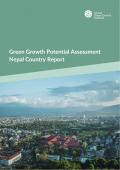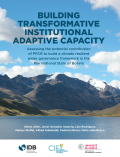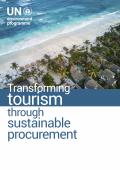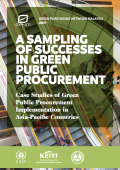
The Green Growth Potential Assessment (GGPA) is a diagnostic tool developed by the Global Green Growth Institute (GGGI) that consists of a combination of data analysis and stakeholder consultation in order to identify and prioritise a country’s opportunities for green growth. This report presents the findings of the GGPA for Nepal.

This paper discusses agriculture in Uganda and suggests that climate change could decrease output per adult by 20% by 2100, due to changes to food consumption and labor supply.

This report assesses the potential contribution of the Pilot Program for Climate Resilience for building a climate resilient water governance framework in the Plurinational State of Bolivia

This case study discusses the role that sustainable procurement could play in transforming tourism by scaling up the market of sustainable products and services.
This report presents the results of the implementation of the Global Bioenergy Partnership (GBEP) indicators in Viet Nam. The overall objective of the project was to strengthen the capacity of Viet Nam and Paraguay to monitor the environmental, social and economic impacts of their bioenergy sector, through the implementation of the GBEP Sustainability Indicators for Bioenergy and related technical support.
This report presents the results of the testing of the GBEP indicators in Indonesia. The testing provided Indonesia with an understanding of how to establish the means of a long-term, periodic monitoring of its domestic bioenergy sector based on the GBEP indicators.
This is a roadmap to sustainable accommodation and MICE sectors in the Philippines, via resource-efficient and low-carbon development. Its vision is to enhance a globally recognized tourism destination that showcases and protects the natural beauty of the Philippines, the hospitality of its people and its cultural identity.

This is a compendium featuring six successful examples of green public procurement implementation in four different Asia-Pacific countries - Thailand, Japan, China, and Korea.
This document presents two case studies which examine the contracting of rubbish collection to the private sector in Papua New Guinea, and possibility of outsourcing household waste collection in Fiji.

This case study analyses how coordination between environment, social, along with economic targets, and sufficient data to monitor progress, are required to deliver the Sustainable Development Goals (SDGs) in Viet Nam.
